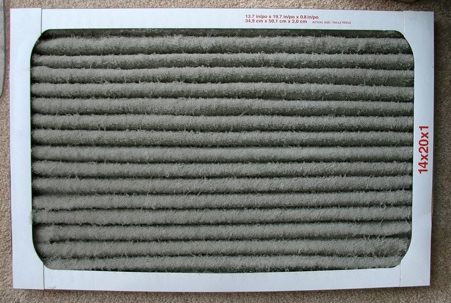Your home’s heating and cooling system rely on air filters, also known as furnace filters, to keep the air in your home clean. But one of the most frequently asked questions we get at Ben’s ProServ is, “How often should I replace my air filter?”
How Often Should I Change My Air Filter?
The stock answer is that air filters should be changed every three months. But the best answer for you depends on a number of factors, including whether you have pets or children, whether any members of your household have allergies or asthma, how often your system runs, and the size of your home.
We recommend that you check your air filter every month. If it’s dirty, swap it out with a fresh one. It’s really that simple. Before you head out to the store to buy a replacement filter, check the size of your current filter. Be sure your replacement is the same size.
What Does a Home Air Filter Do
Depending on what type of filter you buy, your home's air filter can capture dust mites, debris, mold spores, pet dander, smoke, bacteria, dust, pollen, and other particles floating around in the air inside your home. These filters also help to keep the coils and heat exchangers in your central heating, ventilation, and air conditioning (HVAC) system clean, which can extend the life of your system.
What Is a Fiberglass Filter?
Less expensive filters are made up of a layer of fibers – usually fiberglass – and, while they’re more affordable than other filter types, they are not effective at filtering out small pollutants. They are a poor choice for those with respiratory issues. These filters should be changed every 30 days.
What Is a Pleated Air Filter?
Pleated filters, made up of polyester fabrics or cotton folds, are more effective than non-pleated filters because the pleats provide a larger surface area to catch more allergens and pollutants. Sure, the pleated filters cost more, but they can last much longer – often lasting for six months before requiring a change. Using disposable pleated filters is the most cost-efficient choice.
What Merv Filter Do I Need?
Be sure to buy air filters with a MERV (minimum efficiency reporting value) rating of 11 to 13 — the highest ratings are the best. These filters won’t impede the airflow through your HVAC unit and they catch particles such as pollen, pet allergens, and mold.
Invest in an Air Purification System
For those interested in learning about how air purifications systems can further remove unpleasant odors, trap airborne allergens, clean up smoky air and trap dust (some systems can even protect against exposure to COVID-19, among other viral and bacterial risks) read this previous blog or visit the air purification page on our website.

